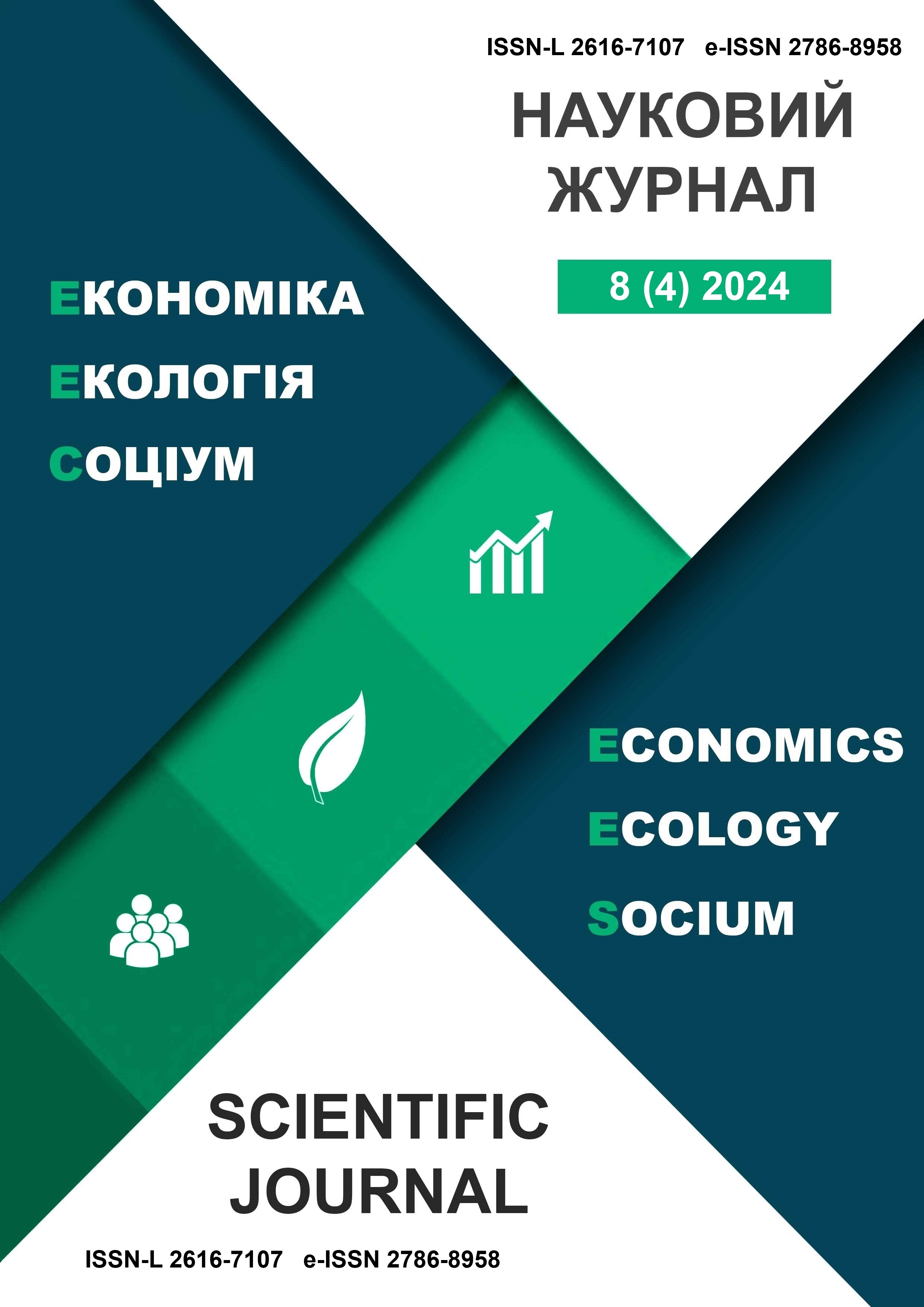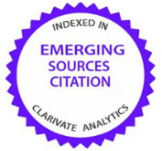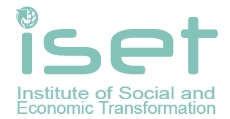A Review of Green Business Negotiations and the Development of Sustainable Business Transitions
Abstract
Introduction. Seeking consistency with the seventeen UN Sustainable Development Goals, business entities are transforming from “doing business as usual” to sustainable business practices. Businesses are encouraged to undergo a green transition process. Green business transitions form a specific context for business negotiations. The engagement of business entities in negotiations largely depends on the willingness of parties to find a solution for the contradictory interests of parties and to come up with a solution for the negotiation problem in the form of a joint decision.
Aim and tasks. The study aims to raise awareness of green thinking for a successful green business transition by using negotiations as a sustainable business practice. For businesses, the process of change that results in becoming successfully green is intertwined with negotiations, where parties strive to achieve outcomes complying with the green business transformation perspective and are constituted as sustainable business deals.
Results. This study justifies the need for a clear definition of green business negotiations and a framework that distinguishes them from conventional ones. Network maps of keyword searches do not reveal a clear link between negotiation and green business transition research. Although literature presents distinct theoretical models of negotiation and negotiation algorithms, they fail to establish cohesive research streams that could be categorized into clusters. This observation indicates that negotiation frameworks and green concepts exist independently in literature. VOSviewer tool was used to represent bibliometric relationships and co-occurrence in the literature visually. Exploration of the potential intersection between these areas is essential to clearly understand their interrelationships and implications for effective green business practices. Additionally, Barber’s Negotiation Phase Model demonstrates that the specific tasks and elements of green business negotiations are integral to all phases of the negotiation process. Understanding these elements can enhance the effectiveness of negotiations related to business sustainability.
Conclusions. The framework that integrates green business negotiation specifics into the Negotiation Phase model provides a nuanced understanding of green business negotiations, highlighting the importance of integrating environmental considerations at each stage of the negotiation process. Practitioners can enhance their strategies and outcomes by recognizing the distinct characteristics and requirements of green business negotiations, ultimately fostering more sustainable business practices. The findings emphasize that integrating green business negotiations within established negotiation frameworks is crucial for enhancing organizational strategies, promoting sustainability, and achieving effective outcomes in green business practice.
Keywords:
green business transition, business negotiation, sustainability, environmental impacts, social responsibility.References
Ali, F., Ashfaq, M., Begum, S., & Ali, A. (2020). How “green” thinking and altruism translate into purchasing intentions for electronics products: The intrinsic-extrinsic motivation mechanism. Sustainable Production and Consumption, 24, 281-291. https://doi.org/10.1016/j.spc.2020.07.013
Banerjee, S. B. (2001). Managerial perceptions of corporate environmentalism: Interpretations from industry and strategic implications for organizations. Journal of Management Studies, 38(4), 489-513. https://doi.org/10.1111/1467-6486.00246
Baber, W. W. (2018). Identifying macro phases across the negotiation lifecycle. Group Decision and Negotiation, 27(6), 885–903. https://doi.org/10.1007/s10726-018-9591-9
Brikena, L. (2023). EU business efficiency and growth: The ex-post phase in business negotiations. Studia Europejskie-Studies in European Affairs, 27(3), 121-142. https://doi.org/10.33067/SE.3.2023.7
Causil, O. M. M., & Morais, D. C. (2023). Multicriteria negotiation model for selecting sustainable suppliers’ problem in the agribusiness. Production, 33, e20220090. https://doi.org/10.1590/0103-6513.20220090
Dean, T. J., & McMullen, J. S. (2007). Toward a theory of sustainable entrepreneurship: Reducing environmental degradation through entrepreneurial action. Journal of Business Venturing, 22(1), 1-24. https://doi.org/10.1016/j.jbusvent.2005.09.003
European Commission. (2019). The European Green Deal: Communication from the Commission. Document 52019DC0640. COM/2019/640 final. Brussels. https://eur-lex.europa.eu/legal-content/EN/ALL/?uri=COM:2019:640:FIN
Kabiraj, S., Topkar, V., & Walke, R. C. (2010). Going green: A holistic approach to transform business. International Journal of Managing Information Technology, 2(3), 13-22. https://doi.org/10.5121/ijmit.2010.2302
Jacobs, K., Petersen, L., Hörisch, J., & Battenfeld, D. (2018). Green thinking but thoughtless buying? An empirical extension of the value-attitude-behaviour hierarchy in sustainable clothing. Journal of Cleaner Production, 203, 507-520. https://doi.org/10.1016/j.jclepro.2018.07.320
Jang, D., Elfenbein, H. A., & Bottom, W. P. (2018). More than a phase: Form and features of a general theory of negotiation. Annals, 12, 318–356. https://doi.org/10.5465/annals.2016.0053
Farid, P., & Waldorff, S. B. (2022). Navigating tensions to create value: An institutional logics perspective on the change program and its organizational context. Project Management Journal, 53(6), 547–566. https://doi.org/10.1177/87569728221111321
Hernandez, A. M. (2022). The phases model of the transformation to sustainability (T2S)—Structuring through the negotiation perspective. Sustainability, 14(9), 5024. https://doi.org/10.3390/su14095024
Kandil, T. T. (2023). Green human resource competency mechanisms: Moderator role between green supply chain and the oil and gas industry environmental performance. Vision. https://doi.org/10.1177/09722629231180684
Karsaklian, E. (2017). Sustainable negotiation: What physics can teach us about international negotiation. Malaysia: Emerald Publishing Limited. https://doi.org/10.1108/9781787145757
Kekkonen, A., Pesor, R., & Täks, M. (2023). Stepping towards the green transition: Challenges and opportunities of Estonian companies. Sustainability, 15, 4172. https://doi.org/10.3390/su15054172
Koskinen, K. U., & Mäkinen, S. (2009). Role of boundary objects in negotiations of project contracts. International Journal of Project Management, 27(1), 31–38. https://doi.org/10.1016/j.ijproman.2007.10.006
Locke, E. A., & Latham, G. P. (2013). Goal setting theory, 1990. In E. A. Locke & G. P. Latham (Eds.), New developments in goal setting and task performance (pp. 3–15). Routledge/Taylor & Francis Group. https://doi.org/10.4324/9780203082744
Menguc, B., & Ozanne, L. K. (2005). Challenges of the “green imperative”: A natural resource-based approach to the environmental orientation-business performance relationship. Journal of Business Research, 58(4), 460-472. https://doi.org/10.1016/j.jbusres.2003.09.002
McGuire, D. (2010). Engaging organizations in environmental change: A greenprint for action. Advances in Developing Human Resources, 12(5), 509-522. https://doi.org/10.1177/1523422310394759
O’Neill, K., & Gibbs, D. (2016). Rethinking green entrepreneurship: Fluid narratives of the green economy. Environment and Planning A: Economy and Space, 48(9), 1727-1749. https://doi.org/10.1177/0308518X16650453
Picaud-Bello, K., Schiele, H., Koch, V., & Francillette, M. (2024). Innovation through sustainability: Identifying purchaser skills fostering green innovation. Cleaner Logistics and Supply Chain, 10, 100136. https://doi.org/10.1016/j.clscn.2023.100136
Sandberg, J., & Alvesson, M. (2021). Meanings of theory: Clarifying theory through typification. Journal of Management Studies, 58(4), 487-516. https://doi.org/10.1111/joms.12587
Shehawy, Y. M., & Khan, S. M. (2024). Consumer readiness for green consumption: The role of green awareness as a moderator of the relationship between green attitudes and purchase intentions. Journal of Retailing and Consumer Services, 78, 103739. https://doi.org/10.1016/j.jretconser.2024.103739
Telukdarie, A., Katsumbe, T., Mahure, H., & Murulane, K. (2024). Exploring the green economy: A systems thinking modelling approach. Journal of Cleaner Production, 436, 140611. https://doi.org/10.1016/j.jclepro.2024.140611
Teymourifar, A., & Trindade, M. A. M. (2023). A framework to design and evaluate green contract mechanisms for forestry supply chains. Sustainability (Switzerland), 15(9), 7668. https://doi.org/10.3390/su15097668
Tseng, M. L., Islam, M. S., Karia, N., Fauzi, F. A., & Afrin, S. (2019). A literature review on green supply chain management: Trends and future challenges. Resources, Conservation and Recycling, 141, 145-162. https://doi.org/10.1016/j.resconrec.2018.10.009
Vojvodić, K., Martinović, M., & Pušić, A. (2020). The relevance of business negotiation in building competitive advantage for Croatian micro enterprises. Journal for International and European Law, Economics and Market Integrations, 7 (1), 47-63. https://doi.org/10.22598/iele.2020.7.1.3
Yasir, M., Majid, A., & Qudratullah, H. (2020). Promoting environmental performance in the manufacturing industry of developing countries through environmental orientation and green business strategies. Journal of Cleaner Production, 275, 123003. https://doi.org/10.1016/j.jclepro.2020.123003
Wei, D. (2020). Modelling and simulation of a multi-agent green supply chain management system for retailers. Journal Européen des Systèmes Automatisés, 53(4), 549–557. https://doi.org/10.18280/jesa.530414
Wu, M., & Long, R. (2024). How does green communication promote the green consumption intention of social media users? Environmental Impact Assessment Review, 106, 107481. https://doi.org/10.1016/j.eiar.2024.107481
If the article is accepted for publication in the journal «Economics. Ecology. Socium» the author must sign an agreementon transfer of copyright. The agreement is sent to the postal (original) or e-mail address (scanned copy) of the journal editions.






















